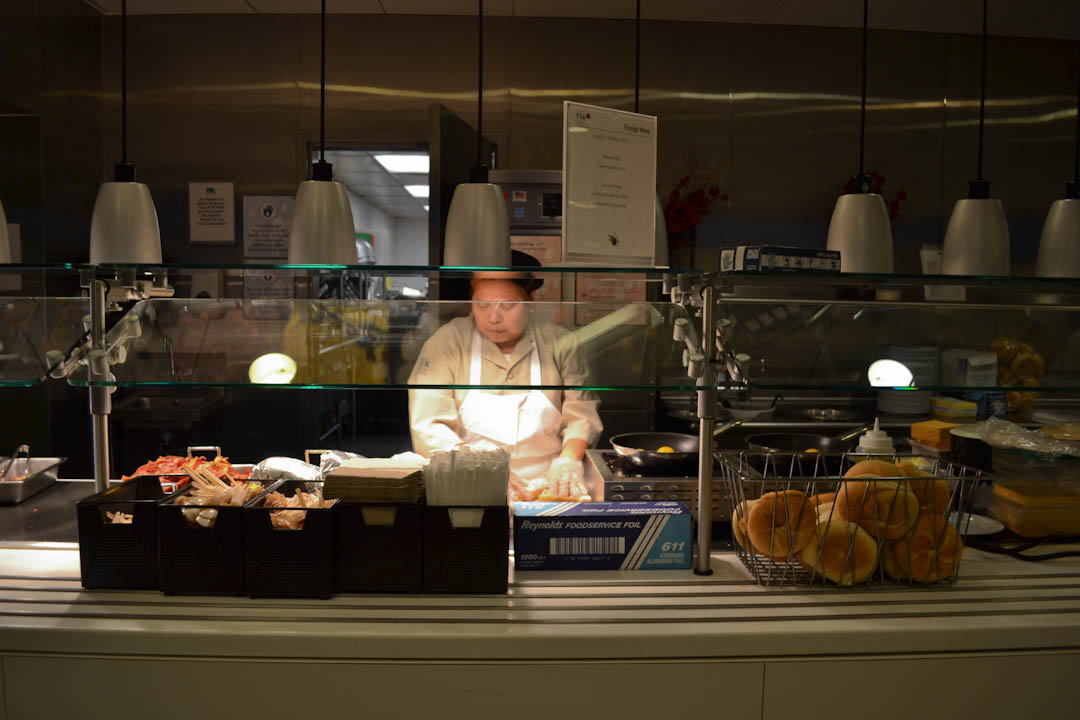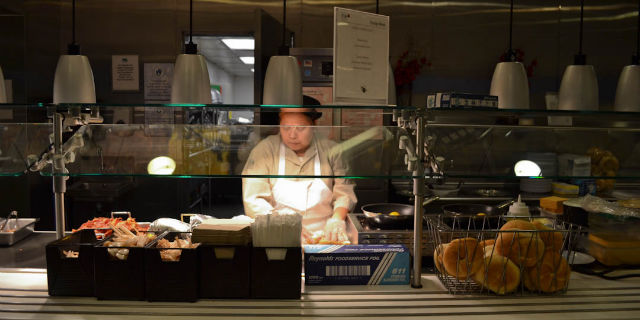
On January 7, 2014, Jerry Musillo, Flik’s Regional Director, issued a statement to the Fieldston faculty and community at large. This message was never forwarded to the students, but the Fieldston News is able to reproduce it here:
“To the Fieldston School Community:
As you may have noticed, Liz Ramos, our Food Service Associate at Fieldston Upper/Middle School has been absent from her regular duties at the school. Flik Independent School Dining, Ms. Ramos and Local 670 are currently involved in some policy concerns.
Ms. Ramos has been a long term employee of Flik Independent School Dining. As with all our associates we respect employee privacy in confidential personnel matters.
Thank you for respecting Ms. Ramos’s privacy during this time.”
Liz Ramos was a staple at Fieldston, “a fixture in the community,” according to English teacher Mr. Morse. In the last weeks of December, Ms. Ramos was suspended indefinitely from work, according to sources close to her. Details at this time are fuzzy, but the Fieldston News has managed to gather much of the story. It is important to note in an investigation like this that the majority of the “story” here was told to us by people sympathetic to Ms. Ramos. Flik (allegedly responsible for Ms. Ramos’s dismissal) and the ECFS administration declined to describe or comment on the incident in any detail.
During the last major snow storm in December, just before break, Ms. Ramos reportedly arrived at school early, looking to park in her pre-assigned spot next to Dr. Fernandez on the hill leading up to the administration building. Ms. Ramos had been assigned this spot after an incident the year before made her feel uncomfortable parking in the school’s upper lot. The spot Ms. Ramos normally occupied was taken by a different vehicle. So, instead of parking in her usual spot, Ms. Ramos pulled into the spot next to her own. A guard, allegedly seeing Ms. Ramos struggling with the snow, came and helped her up the hill. According to one source, later on in the day Ms. Ramos was asked to come to the office of Fieldston’s Head of Security, Bob Sena. Flik Manager Angelo Spilios and the car owner who had taken Ms. Ramos’s spot were also at the meeting. Mr. Sena denied his presence at this meeting; Mr. Spilios had no comment. The car owner, a BMS employee, ostensibly accused Ms. Ramos of scratching her car, claiming that Ms. Ramos did so out of frustration. Ms. Ramos, according to one source, is quoted saying “I could kill that woman for the lie she said.” At this moment in the meeting, an administrator informed me, Ms. Ramos was “fired.” It is unclear if she was “fired” for threatening an employee in front of her supervisors or for allegedly vandalizing a colleague’s vehicle. Others say that her official status is: “suspended pending an investigation.”
We reached out to Flik for comment and originally received no response. The BMS employee allegedly responsible for accusing Ms. Ramos of scratching her car told me there “was nothing for [her] to say.” While the school administration has publicly stated it had no direct involvement in the affair, some say that Director of Related Programs and Campus Operations, Bill Guerrero, played a role in the termination. Mr. Guerrero himself denies this accusation, telling us he knows “nothing more than [you] do.”

Damian Fernandez, Fieldston’s Head of School, upon hearing that this article was being written, told The Fieldston News: “Liz worked in the Fieldston cafeteria for many years with a generation of students. We are confident that the collective bargaining process that is in place for FLIK employees will result in a fair resolution of this issue.”
Laura Danforth, Upper School Principal, also talked to us: “These are among the most difficult situations in a school or community, and no one can pretend to be objective about them. But we can put into place processes and guideposts that help us make the best decisions possible. I believe that everyone involved in such decisions (in this case, FLIK) has the best interests of the ECFS community in mind, and, even when it is hard, everyone needs to trust that.”
With a lack of hard facts about a loved employee’s absence, people in the Fieldston community are coming up with their own narratives based on feelings and past experiences with Ms. Ramos.
Mr. Morse, a member of the Faculty Council, says that the teachers would “love to have [Liz] back if possible.” The Faculty Council is responsible for hearing “what people are concerned about in terms of quality of life at Fieldston,” and recently, he noted, a lot of people have been “really upset about what happened to Liz.” According to another faculty member, there was “a feeling protocols were not followed in her termination.” “It’s a tricky situation,” Mr. Morse acknowledges, “Fieldston has outsourced a lot of its work — the maintenance, the security, the food staff. It’s not as though Liz and I share a boss, so one of the concerns that the faculty have about the situation overall is that sometimes when you outsource you don’t feel like you know what’s going on with a colleague.” For his part, Mr. Morse and the Faculty Council have sent a letter to Dr. Fernandez, “calling on the administration to do what it can, to honor due process and achieve a swift and sensitive resolution for the recent crisis involving Liz Ramos and her subsequent suspension from work.”
“Without Liz I feel that the lunch room doesn’t fully have the family like feel it used to.”
But not everyone echoes the sentiments that Mr. Morse and some faculty members share. A couple of people in the community have reported that Ms. Ramos had a history of rude and disrespectful behavior. For example, when Fieldston’s breakfast program was cancelled, Ms. Ramos lashed out at various teachers and students in the school. “If [Liz] didn’t like something — whether it was a program or a person — you knew about it,” a source who has asked to remain anonymous informed me. This person has heard that “some students and faculty don’t pay for their breakfast food, while others are granted a free breakfast. Something doesn’t seem right to me there.”
Another person, also asking that her identity remain confidential, spoke to me about an experience with Ms. Ramos and her breakfast program. “A student informed me,” this person says, that “although breakfast was supposed to close at 9:00 am, it had been closing a half-hour earlier. I went to investigate.” At 8:45 am the next day this person asked Ms. Ramos if an omelet could be made. Ms. Ramos said no. Wondering why Ms. Ramos refused to make her breakfast, this person pushed harder for an answer. After three days of being repeatedly yelled at and put off, “Liz went off on me,” my source tells me. “She yelled at me and told me: ‘I feel sorry for your husband.’” At this point, feeling “insulted,” the person filed a complaint to Ms. Ramos’s boss.
Yet another person, familiar with Ms. Ramos’s situation, informed me that “Liz often gave preferential treatment to certain faculty for unknown reasons. If she liked you, you might get that special breakfast burrito but [if not], she actually refused to sell the burrito to certain people! Faculty overcompensated to either gain favor or to avoid her wrath.” In another instance Ms. Ramos “riled up the faculty by telling us that we would no longer have choices of different teas and coffee in the Faculty Lounge. It seems petty, but faculty got angry at the administration for no reason. Liz tended to spread rumors and exaggerate.”
On the other hand, middle-school history teacher Ms. Pasquantonio remembers how “Liz always greeted [her] with a warm wonderful smile which [she] misses very much.” She thinks “workers like Liz who can make the school function in so many ways are priceless to an institution.”
Mr. Baglio, a Middle School science teacher, was equally confused and upset by the departure. “Whenever someone who has been here as long as Liz leaves,” he tells me, “it feels like this person was sort of torn from our history.” He fondly remembers that when he first started working at Fieldston he would always tell people that “we got the best $1.50 breakfast sandwich in NYC, on a fresh roll with the bacon and the eggs and the cheese.” For his part “[he] just [wishes he] could say goodbye.”

Justin Radin, Form V, says that although he didn’t know Ms. Ramos well, “her kind smile always made [his] day start off nicely.” Farzana Islam, Form III, is Muslim and “can’t eat certain foods. [Liz] always informs me of what I can and cannot eat. Liz truly makes my lunch experience at Fieldston enjoyable; without Liz I feel that the lunch room doesn’t fully have the family like feel it used to.”
Maura Furfey, a High School Spanish teacher who has worked closely with Ms. Ramos over the years, says that “Liz’s relationship with [the] students is one of motherly love.” Ms. Furfey frequently asked Ms. Ramos to come and speak to her students about Colombia. “She has shared many stories of food, family, music, and cultural assimilation to the United States. My students get so much out of these exchanges.” As for Ms. Ramos’s departure, Ms. Furfey tells me “I suppose I’m in denial. I just don’t believe it. I am still very much hoping to see her again soon. It would be a terrible loss if that was not the case.”
As for Ms. Ramos herself? In a recent phone call interview, Ms. Ramos told me she was “so sick to come back.” “I’m so depressed,” she said, “oh my God, I can’t believe 30 years I never had a problem and one person who has been here for one year tells on me and they do this to me.” “Fieldston is my family,” Ms. Ramos tells me, “Fieldston is my life.”
It’s been almost two months now, and we’re still left largely in the dark. Bits and pieces of a complex puzzle fly around like rumors in the hallways. But perhaps there’s more to the story than a simple misunderstanding. While Ms. Ramos is not an official Fieldston employee (she is contracted by Flik), I spoke to Joan Walrond, Fieldston’s HR representative, who told me that “the school has zero tolerance for violence or threats.” Michael Hwang, Fieldston’s CFO, told me that in a situation like this one, referring to Ms. Ramos’s dismissal, “the school as a client has some influence, but ultimately the decision is Flik’s to make.” When I spoke to Angelo Spilios, Flik Manager, he was eager to tell me the full story, but due to “union policy and legal reasons,” he could not.
We may never learn the full story, but it is essential that students and faculty alike understand that the situation here is more complicated than what first meets the eye.






